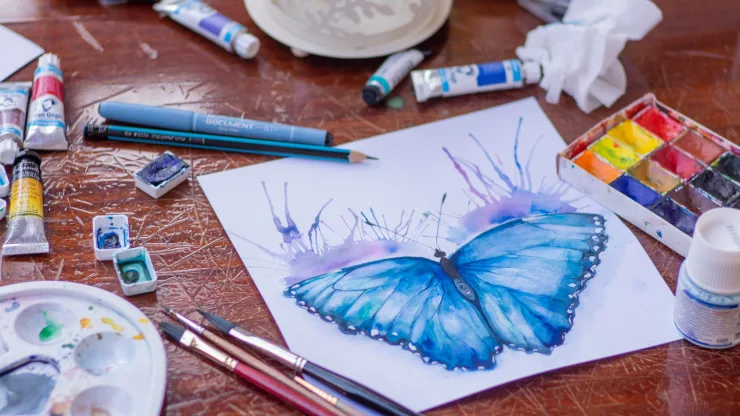Art Therapy: A Creative Approach to Boost Happiness and Well-being
Art therapy is a type of therapy that incorporates the use of art materials, such as paint, clay, and markers, to help individuals express themselves creatively. It is a form of psychotherapy that is used to help individuals improve their mental health and well-being. Art therapy is a non-invasive, creative approach to therapy that can help individuals deal with a variety of mental health issues.
Art therapy is based on the belief that the creative process involved in making art is therapeutic and can help individuals to express themselves and their emotions.
It is a form of therapy that is used to help individuals deal with a variety of mental health issues, including anxiety, depression, and trauma.
In art therapy, the focus is on the process of creating art rather than the final product.
Jump to Section
How Does Art Therapy Work?
Art therapy works by providing a safe and non-judgmental space for individuals to express themselves creatively.
By using art materials, individuals can express their emotions and feelings in a way that may be difficult to do through traditional talk therapy.
Art therapy can also help individuals to develop a greater sense of self-awareness and self-esteem.
Art therapy can be used in a variety of settings, including hospitals, schools, and mental health clinics. It is often used in conjunction with other forms of therapy, such as cognitive-behavioral therapy or psychotherapy.
Art therapy can be used with individuals of all ages, from children to the elderly.
Benefits of Art Therapy for Mental Health
Art therapy has been found to have a number of benefits for mental health, including:
- Reducing anxiety and depression
- Increasing self-esteem and self-awareness
- Improving social skills and communication
- Providing a sense of control and empowerment
- Reducing stress and improving relaxation
- Promoting emotional resilience
Art therapy can be a valuable tool for individuals dealing with a variety of mental health issues, including PTSD, ADHD, and addiction. It can also be helpful for individuals dealing with chronic pain or illness.
Techniques Used in Art Therapy
There are a variety of techniques used in art therapy, including:
- Free-form drawing and painting
- Collage making
- Sculpture and clay work
- Digital art
- Photography
The techniques used in art therapy will depend on the individual’s needs and preferences. Art therapists are trained to work with individuals to determine which techniques will be most effective for them.
Success Stories: Real-life Examples
Art therapy has helped many individuals to improve their mental health and well-being. One example is a woman who was struggling with depression and anxiety.
Through art therapy, she was able to express her emotions and feelings in a way that she had not been able to do through traditional therapy. She also developed a greater sense of self-awareness and self-esteem.
Another example is a child with ADHD who was struggling in school. Through art therapy, he was able to develop better social skills and improved communication with his peers.
He was also able to develop a greater sense of control and empowerment, which helped him to better manage his symptoms.
How to Incorporate Art Therapy into Your Life
There are a number of ways to incorporate art therapy into your life, including:
- Joining an art therapy group or workshop
- Working with an art therapist one-on-one
- Incorporating art-making into your daily routine
- Using art materials to express your emotions and feelings
Art therapy does not require any special skills or artistic talent. It is about the process of creating art, not the final product.
Anyone can benefit from incorporating art therapy into their life.
FAQ
What types of mental health issues can art therapy help with?
Art therapy can be helpful for individuals dealing with a variety of mental health issues, including anxiety, depression, PTSD, ADHD, addiction, and chronic pain or illness.
Do I need to have any artistic talent or skills to benefit from art therapy?
No, you do not need to have any special artistic talent or skills to benefit from art therapy. The focus is on the process of creating art, not the final product.
How can I find an art therapist?
You can find an art therapist through the American Art Therapy Association or by asking your healthcare provider for a referral.

With a deep passion for personal development, Ben has dedicated his career to inspiring and guiding others on their journey towards self-improvement.
His love for learning and sharing knowledge about personal growth strategies, mindfulness, and goal-setting principles has led him to create My Virtual Life Coach.
Contact Ben at [email protected] for assistance.




